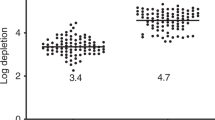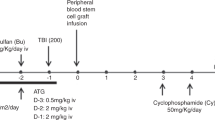Abstract
Haploidentical hematopoietic cell transplantation (HHCT) using CD34 selected grafts is complicated by slow engraftment and immune reconstitution. Engraftment and immune reconstitution might be improved using CD3/CD19-depleted grafts and reduced intensity conditioning (RIC). We report on 28 patients after HHCT with CD3/CD19-depleted grafts using RIC, which were prospectively evaluated for engraftment and immune reconstitution. Engraftment was rapid with full chimerism reached on day +15 after HHCT. T-cell reconstitution was delayed with a median of 205 CD3+ cells/μl, 70 CD3+CD4+ cells/μl and 66 CD3+ CD8+ cells/μl on day +100, respectively. A skewed T-cell receptor-Vβ repertoire with oligoclonal T-cell expansions to day +100 and normalization after day +200 was observed. B-cell reconstitution was slow with a median of 100 CD19+ CD20+ cells/μl on day +150. Natural killer (NK) cell engraftment was fast reaching normal values on day +20. An increased natural cytotoxicity receptor and NKG2A, but decreased NKG2D and KIR expressions were observed on NK cells until day +100. We observed a positive impact of donor lymphocyte infusions on immune reconstitution. In conclusion, after HHCT, using CD3/CD19-depleted grafts and RIC, T- and B-cell reconstitution is delayed, whereas NK-cell reconstitution occurs early and fast.
This is a preview of subscription content, access via your institution
Access options
Subscribe to this journal
Receive 12 print issues and online access
$259.00 per year
only $21.58 per issue
Buy this article
- Purchase on Springer Link
- Instant access to full article PDF
Prices may be subject to local taxes which are calculated during checkout





Similar content being viewed by others
References
Gale RP, Reisner Y . Graft rejection and graft-versus-host disease: mirror images. Lancet 1986; 1: 1468–1470.
Aversa F, Tabilio A, Velardi A, Cunningham I, Terenzi A, Falzetti F et al. Treatment of high-risk acute leukemia with T-cell-depleted stem cells from related donors with one fully mismatched HLA haplotype. N Engl J Med 1998; 339: 1186–1193.
Aversa F, Terenzi A, Tabilio A, Falzetti F, Carotti A, Ballanti S et al. Full haplotype-mismatched hematopoietic stem-cell transplantation: a phase II study in patients with acute leukemia at high risk of relapse. J Clin Oncol 2005; 23: 3447–3454.
Lang P, Bader P, Schumm M, Feuchtinger T, Einsele H, Fuhrer M et al. Transplantation of a combination of CD133+ and CD34+ selected progenitor cells from alternative donors. Br J Haematol 2004; 124: 72–79.
Bethge WA, Haegele M, Faul C, Lang P, Schumm M, Bornhauser M et al. Haploidentical allogeneic hematopoietic cell transplantation in adults with reduced-intensity conditioning and CD3/CD19 depletion: fast engraftment and low toxicity. Exp Hematol 2006; 34: 1746–1752.
Barfield RC, Otto M, Houston J, Holladay M, Geiger T, Martin J et al. A one-step large-scale method for T- and B-cell depletion of mobilized PBSC for allogeneic transplantation. Cytotherapy 2004; 6: 1–6.
Grimes HL, Schanie CL, Huang Y, Cramer D, Rezzoug F, Fugier-Vivier I et al. Graft facilitating cells are derived from hematopoietic stem cells and functionally require CD3, but are distinct from T lymphocytes. Exp Hematol 2004; 32: 946–954.
Bethge WA, Faul C, Bornhauser M, Stuhler G, Beelen DW, Lang P et al. Haploidentical allogeneic hematopoietic cell transplantation in adults using CD3/CD19 depletion and reduced intensity conditioning: an update. Blood Cells Mol Dis 2008; 40: 13–19.
Schumm M, Feuchtinger T, Pfeiffer M, Hoelle W, Bethge W, Ebinger M et al. Flow cytometry with anti HLA-antibodies: a simple but highly sensitive method for monitoring chimerism and minimal residual disease after HLA-mismatched stem cell transplantation. Bone Marrow Transplant 2007; 39: 767–773.
Bader P, Beck J, Frey A, Schlegel PG, Hebarth H, Handgretinger R et al. Serial and quantitative analysis of mixed hematopoietic chimerism by PCR in patients with acute leukemias allows the prediction of relapse after allogeneic BMT. Bone Marrow Transplant 1998; 21: 487–495.
Schumm M, Feuchtinger T, Pfeiffer M, Hoelle W, Bethge W, Ebinger M et al. Flow cytometry with anti HLA-antibodies: a simple but highly sensitive method for monitoring chimerism and minimal residual disease after HLA-mismatched stem cell transplantation. Bone Marrow Transplant 2007; 39: 767–773.
van den Beemd R, Boor PP, van Lochem EG, Hop WC, Langerak AW, Wolvers-Tettero IL et al. Flow cytometric analysis of the Vβ repertoire in healthy controls. Cytometry 2000; 40: 336–345.
Ruggeri L, Capanni M, Urbani E, Perruccio K, Shlomchik WD, Tosti A et al. Effectiveness of donor natural killer cell alloreactivity in mismatched hematopoietic transplants. Science 2002; 295: 2097–2100.
Mackall CL, Bare CV, Granger LA, Sharrow SO, Titus JA, Gress RE . Thymic-independent T cell regeneration occurs via antigen-driven expansion of peripheral T cells resulting in a repertoire that is limited in diversity and prone to skewing. J Immunol 1996; 156: 4609–4616.
Mackall CL, Gress RE . Pathways of T-cell regeneration in mice and humans: implications for bone marrow transplantation and immunotherapy. Immunol Rev 1997; 157: 61–72.
Heitger A, Neu N, Kern H, Panzer-Grumayer ER, Greinix H, Nachbaur D et al. Essential role of the thymus to reconstitute naive (CD45RA+) T-helper cells after human allogeneic bone marrow transplantation. Blood 1997; 90: 850–857.
Lang P, Schumm M, Greil J, Bader P, Klingebiel T, Muller I et al. A comparison between three graft manipulation methods for haploidentical stem cell transplantation in pediatric patients: preliminary results of a pilot study. Klin Padiatr 2005; 217: 334–338.
Novitzky N, Davison GM, Hale G, Waldmann H . Immune reconstitution at 6 months following T-cell depleted hematopoietic stem cell transplantation is predictive for treatment outcome. Transplantation 2002; 74: 1551–1559.
Geddes M, Storek J . Immune reconstitution following hematopoietic stem-cell transplantation. Best Pract Res Clin Haematol 2007; 20: 329–348.
Shaffer J, Villard J, Means TK, Alexander S, Dombkowski D, Dey BR et al. Regulatory T-cell recovery in recipients of haploidentical nonmyeloablative hematopoietic cell transplantation with a humanized anti-CD2mAb, MEDI-507, with or without fludarabine. Exp Hematol 2007; 35: 1140–1152.
Eyrich M, Lang P, Lal S, Bader P, Handgretinger R, Klingebiel T et al. A prospective analysis of the pattern of immune reconstitution in a paediatric cohort following transplantation of positively selected human leucocyte antigen-disparate haematopoietic stem cells from parental donors. Br J Haematol 2001; 114: 422–432.
Volpi I, Perruccio K, Tosti A, Capanni M, Ruggeri L, Posati S et al. Postgrafting administration of granulocyte colony-stimulating factor impairs functional immune recovery in recipients of human leukocyte antigen haplotype-mismatched hematopoietic transplants. Blood 2001; 97: 2514–2521.
Verfuerth S, Peggs K, Vyas P, Barnett L, O’Reilly RJ, MacKinnon S . Longitudinal monitoring of immune reconstitution by CDR3 size spectratyping after T-cell-depleted allogeneic bone marrow transplant and the effect of donor lymphocyte infusions on T-cell repertoire. Blood 2000; 95: 3990–3995.
Eyrich M, Croner T, Leiler C, Lang P, Bader P, Klingebiel T et al. Distinct contributions of CD4(+) and CD8(+) naive and memory T-cell subsets to overall T-cell-receptor repertoire complexity following transplantation of T-cell-depleted CD34-selected hematopoietic progenitor cells from unrelated donors. Blood 2002; 100: 1915–1918.
Kook H, Goldman F, Padley D, Giller R, Rumelhart S, Holida M et al. Reconstruction of the immune system after unrelated or partially matched T-cell-depleted bone marrow transplantation in children: immunophenotypic analysis and factors affecting the speed of recovery. Blood 1996; 88: 1089–1097.
Banfi A, Bianchi G, Galotto M, Cancedda R, Quarto R . Bone marrow stromal damage after chemo/radiotherapy: occurrence, consequences and possibilities of treatment. Leuk Lymphoma 2001; 42: 863–870.
Ruggeri L, Capanni M, Casucci M, Volpi I, Tosti A, Perruccio K et al. Role of natural killer cell alloreactivity in HLA-mismatched hematopoietic stem cell transplantation. Blood 1999; 94: 333–339.
Cook M, Briggs D, Craddock C, Mahendra P, Milligan D, Fegan C et al. Donor KIR genotype has a major influence on the rate of cytomegalovirus reactivation following T-cell replete stem cell transplantation. Blood 2006; 107: 1230–1232.
Morrison BE, Park SJ, Mooney JM, Mehrad B . Chemokine-mediated recruitment of NK cells is a critical host defense mechanism in invasive aspergillosis. J Clin Invest 2003; 112: 1862–1870.
Martinez C, Urbano-Ispizua A, Rozman C, Marin P, Rovira M, Sierra J et al. Immune reconstitution following allogeneic peripheral blood progenitor cell transplantation: comparison of recipients of positive CD34+ selected grafts with recipients of unmanipulated grafts. Exp Hematol 1999; 27: 561–568.
Davies JK, Gribben JG, Brennan LL, Yuk D, Nadler LM, Guinan EC . Outcome of alloanergized haploidentical bone marrow transplantation after ex vivo costimulatory blockade: results of 2 phase 1 studies. Blood 2008; 112: 2232–2241.
Pfeiffer MM, Feuchtinger T, Teltschik HM, Schumm M, Muller I, Handgretinger R et al. Reconstitution of NK cell receptors influences NK activity and relapse rate after haploidentical transplantation of T and B cell depleted grafts in children. Haematologica 2010; 95: 1381–1388.
Eissens DN, Schaap NP, Preijers FW, Dolstra H, van Cranenbroek B, Schattenberg AV et al. CD3(+)/CD19(+)-depleted grafts in HLA-matched allogeneic peripheral blood stem cell transplantation lead to early NK cell cytolytic responses and reduced inhibitory activity of NKG2A. Leukemia 2010; 24: 583–591.
Gentilini C, Haegele M, Muessig A, Nogai A, Kliem C, Bartsch K et al. NK-cell recovery and immune reconstitution after haploidentical hematopoietic cell transplantation using either CD34 selected grafts and adoptive NK-cell transfer or CD3/CD19 depleted grafts: comparison of two strategies for NK cell based immunotherapy. Blood (ASH Abstracts) 2007; 110: 2988. 2010.
Chen X, Hale GA, Barfield R, Benaim E, Leung WH, Knowles J et al. Rapid immune reconstitution after a reduced-intensity conditioning regimen and a CD3-depleted haploidentical stem cell graft for paediatric refractory haematological malignancies. Br J Haematol 2006; 135: 524–532.
Nguyen S, Dhedin N, Vernant JP, Kuentz M, Al Jijakli A, Rouas-Freiss N et al. NK-cell reconstitution after haploidentical hematopoietic stem-cell transplantations: immaturity of NK cells and inhibitory effect of NKG2A override GvL effect. Blood 2005; 105: 4135–4142.
Cooley S, McCullar V, Wangen R, Bergemann TL, Spellman S, Weisdorf DJ et al. KIR reconstitution is altered by T cells in the graft and correlates with clinical outcomes after unrelated donor transplantation. Blood 2005; 106: 4370–4376.
Ruggeri L, Mancusi A, Capanni M, Urbani E, Carotti A, Aloisi T et al. Donor natural killer cell allorecognition of missing self in haploidentical hematopoietic transplantation for acute myeloid leukemia: challenging its predictive value. Blood 2007; 110: 433–440.
Traversari C, Marktel S, Magnani Z, Mangia P, Russo V, Ciceri F et al. The potential immunogenicity of the TK suicide gene does not prevent full clinical benefit associated with the use of TK-transduced donor lymphocytes in HSCT for hematologic malignancies. Blood 2007; 109: 4708–4715.
Acknowledgements
We would like to thank Susanne Schneider, Stephanie Katz and Stefanie Ackermann for their excellent technical assistance. Furthermore we thank the nurses and stuff of our outpatient department and transplantation unit.
Author information
Authors and Affiliations
Corresponding author
Ethics declarations
Competing interests
The authors declare no conflict of interest.
Rights and permissions
About this article
Cite this article
Federmann, B., Hägele, M., Pfeiffer, M. et al. Immune reconstitution after haploidentical hematopoietic cell transplantation: impact of reduced intensity conditioning and CD3/CD19 depleted grafts. Leukemia 25, 121–129 (2011). https://doi.org/10.1038/leu.2010.235
Received:
Revised:
Accepted:
Published:
Issue Date:
DOI: https://doi.org/10.1038/leu.2010.235
Keywords
This article is cited by
-
Results of a multicenter phase I/II trial of TCRαβ and CD19-depleted haploidentical hematopoietic stem cell transplantation for adult and pediatric patients
Bone Marrow Transplantation (2022)
-
Comparison of clinical outcomes between unrelated single umbilical cord blood and “ex-vivo” T-cell depleted haploidentical transplantation in children with hematological malignancies
World Journal of Pediatrics (2021)
-
Strategies of adoptive T -cell transfer to treat refractory viral infections post allogeneic stem cell transplantation
Journal of Hematology & Oncology (2019)
-
The immune response to cytomegalovirus in allogeneic hematopoietic stem cell transplant recipients
Cellular and Molecular Life Sciences (2015)



